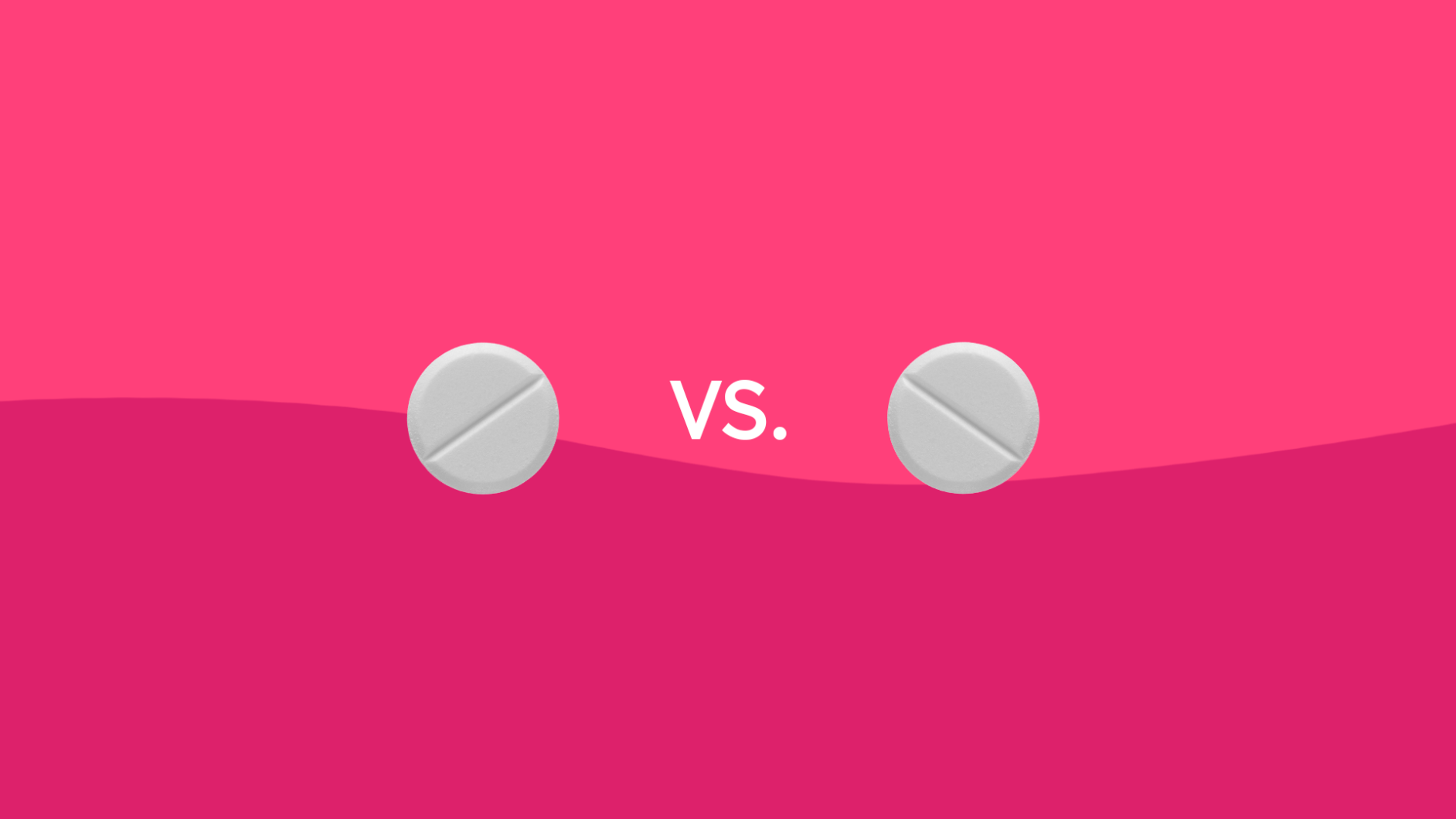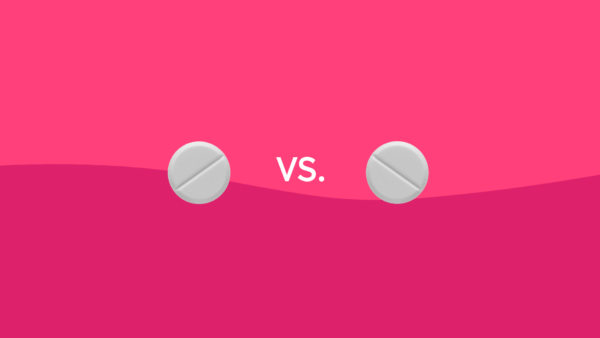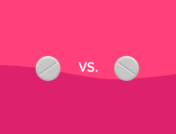Drug overview & main differences | Conditions treated | Efficacy | Insurance coverage and cost comparison | Side effects | Drug interactions | Warnings | FAQ
Percocet and Norco are two prescription pain relievers used for the treatment of severe pain. They are classified in a group of medications called opioid (narcotic) analgesics. They work by binding to mu receptors in the brain, weakening and blocking pain signals. By doing so, they relieve pain. Both medications are classified by the DEA as Schedule II drugs. This means they have a high potential for drug abuse and can lead to psychological or physical dependence. Percocet and Norco are known as opioid analgesics and have many similarities, but they also do have some notable differences.
What are the main differences between Percocet and Norco?
Percocet and Norco are combination drugs, used for the treatment of severe, acute pain. Percocet (Percocet coupons | What is Percocet?) contains oxycodone and acetaminophen. Acetaminophen is generic Tylenol and is also known as APAP, so the drug name on your label may appear as oxycodone/APAP.
Norco contains hydrocodone and APAP. Both medications are available in brand name and generic. Both drugs are intended to be used for short-term pain relief, however, some patients continue taking Percocet or Norco for longer, depending on the doctor’s instruction. All patients on Percocet or Norco should be closely monitored.
| Main differences between Percocet and Norco | ||
|---|---|---|
| Percocet | Norco | |
| Drug class | Opioid (narcotic) analgesic | Opioid (narcotic) analgesic |
| Brand/generic status | Brand and generic | Brand and generic |
| What is the generic name? | Oxycodone/APAP | Hydrocodone/APAP |
| What form(s) does the drug come in? | Tablet | Tablet |
| What is the standard dosage? | Example: Oxycodone 5 mg/APAP 325 mg: 1 tablet every 4 to 6 hours as needed for pain | Example: Hydrocodone 5 mg/APAP 325 mg: 1 tablet every 4 to 6 hours as needed for pain |
| How long is the typical treatment? | Short-term, some patients continue longer under doctor’s direction | Short-term, some patients continue longer under doctor’s direction |
| Who typically uses the medication? | Adults | Adults |
Conditions treated by Percocet vs. Norco
Percocet and Norco are both indicated to manage pain that is severe enough to require an opioid painkiller. Percocet or Norco should only be used when other, non-opioid drugs cannot be tolerated, or are not adequately treating the pain.
| Condition | Percocet | Norco |
| Management of pain severe enough to require an opioid analgesic and for which alternative treatments are inadequate | Yes | Yes |
Is Percocet or Norco more effective?
In a study of emergency room patients with acute fractures who received Percocet or Norco, pain relief was the same at 30 and 60 minutes with either drug. The authors concluded that both drugs provided similar pain-relieving effects. Another study came to the same conclusions; pain relief was the same from Percocet or Norco—both drugs reduced pain by about 50%. One very small study of 20 patients concluded that Percocet is 1.5 times stronger than Norco.
The most effective medication for pain should only be determined by your healthcare provider, who can look at the full picture of your medical condition(s) and history, and other medications you take.
Want the best price on Percocet?
Sign up for Percocet price alerts and find out when the price changes!
Coverage and cost comparison of Percocet vs. Norco
Percocet and Norco are covered by most insurance and Medicare Part D plans in the generic forms. For brands, you may pay a higher copay or the drug may not be covered. A typical prescription for generic Percocet would be for 20 tablets of 5/325 mg and cost about $25-$50 out-of-pocket. A typical prescription for generic Norco would be for 20 tablets of 5/325 mg can cost over $100 out-of-pocket. You can purchase generic Percocet for around $14 and generic Norco from $27-$42 with a SingleCare coupon.
Get the SingleCare prescription discount card
| Percocet | Norco | |
| Typically covered by insurance? | Yes | Yes |
| Typically covered by Medicare Part D | Yes | Yes |
| Standard dosage | #20, oxycodone/APAP 5/325 mg tablets | #20, hydrocodone/APAP 5/325 mg tablets |
| Typical Medicare copay | $0-$25 | $0-$100 |
| SingleCare cost | $14 | $10-$16 |
Common side effects of Percocet and Norco
Serious adverse effects that may occur with Percocet or Norco are respiratory depression (slow breathing/not enough oxygen), apnea, respiratory arrest, hypotension (low blood pressure), and shock.
The most common side effects of Percocet are lightheadedness, dizziness, drowsiness/sedation, nausea, and vomiting; followed by euphoria, dysphoria, constipation, and pruritus (itching).
The most common side effects of Norco are lightheadedness, dizziness, sedation, nausea, and vomiting.
Serotonin syndrome is a serious, life-threatening reaction that could occur with Percocet or Norco, especially when taken with other drugs that increase serotonin.
Other side effects may occur. Consult your healthcare professional for a full list of side effects.
Want the best price on Norco?
Sign up for Norco price alerts and find out when the price changes!
Drug interactions of Percocet vs. Norco
Taking Percocet or Norco with certain medications that are metabolized by the CYP3A4 or CYP2D6 enzyme may result in a drug interaction. These drugs are also known as enzyme inhibitors and include drugs such as macrolide antibiotics, azole antifungals, and protease inhibitors. Using them with Percocet or Norco can result in a buildup of the opioid in your body, which can be very dangerous.
Other drugs, known as enzyme inducers, have the opposite effect as inhibitors, lowering the opioid level so that it is not effective or can even cause withdrawal symptoms.
Using benzodiazepines or other CNS depressants (including other opioids) in combination with Percocet or Norco can lead to hypotension (low blood pressure), respiratory depression, profound sedation, coma, or even death.
Taking Percocet or Norco with drugs that increase serotonin increases the risk of serotonin syndrome, which can be very serious or even life-threatening. These drugs include certain antidepressants like SSRI, SNRI, and tricyclic antidepressants, muscle relaxants, MAO inhibitors (MAO inhibitors should not be used within 14 days of Percocet or Norco), and triptans for migraine.
If you are taking Percocet or Norco, remember that the medication contains APAP, and many over-the-counter cough or cold medications and pain relievers contain APAP as well. Check with your pharmacist, who can help you select an OTC medication that does not contain APAP.
Consult your healthcare provider for a full list of drug interactions.
| Drug | Drug Class | Percocet | Norco |
| Erythromycin Biaxin (clarithromycin) |
Macrolide antibiotics | Yes | Yes |
| Diflucan (fluconazole) Nizoral (ketoconazole) |
Azole antifungals | Yes | Yes |
| Norvir (ritonavir) | Protease inhibitors | Yes | Yes |
| Rifampin Tegretol (carbamazepine) Dilantin (phenytoin) |
CYP3A4 inducers | Yes | Yes |
| Xanax (alprazolam) Valium (diazepam) Ativan (lorazepam) Klonopin (clonazepam) |
Benzodiazepines | Yes | Yes |
| Methadone Ultram (tramadol) Tylenol with codeine (APAP/codeine) Duragesic (fentanyl) Morphine |
Opioids | Yes | Yes |
| Alcohol | Alcohol | Yes | Yes |
| Flexeril (cyclobenzaprine) Skelaxin (metaxalone) Lioresal (baclofen) |
Muscle relaxants | Yes | Yes |
| Imitrex (sumatriptan) Maxalt (rizatriptan) |
Triptans | Yes | Yes |
| Prozac (fluoxetine) Paxil (paroxetine) Zoloft (sertraline) Celexa (citalopram) Lexapro (escitalopram) |
SSRI antidepressants | Yes | Yes |
| Pamelor (nortriptyline) Elavil (amitriptyline) |
Tricyclic antidepressants | Yes | Yes |
| Cymbalta (duloxetine) Effexor (venlafaxine) Pristiq (desvenlafaxine) |
SNRI antidepressants | Yes | Yes |
| Hydrochlorothiazide Lasix (furosemide) |
Diuretics | Yes | Yes |
| Azilect (rasagiline) Eldepryl (selegiline) Parnate (tranylcypromine) |
MAO inhibitors | Yes | Yes |
| Inderal (propranolol) Lopressor, Toprol XL (metoprolol) |
Beta blockers | Yes | Yes |
| Cogentin (benztropine) Benadryl (diphenhydramine) Ditropan (oxybutynin) Detrol (tolterodine) |
Anticholinergic drugs | Yes | Yes |
Warnings of Percocet and Norco
Both drugs come with a boxed warning, which is the strongest warning as required by the FDA. Here are additional warnings:
- There is a potential for abuse, misuse, and addiction, which could result in overdose and death. Take your medication as prescribed; do not take additional doses or use the medication for other conditions.
- Serious, life-threatening respiratory depression may occur. Patients should be monitored, especially during the beginning of treatment and with any dosage change. Elderly patients and patients with lung disease are at higher risk.
- Accidental ingestion by anyone, especially children, may result in a fatal overdose.
- Prolonged use of opioids during pregnancy can result in neonatal opioid withdrawal syndrome.
- Acetaminophen has been associated with liver damage or failure, which could result in the need for a liver transplant or death. Patients should be aware of the maximum daily dose of acetaminophen (ask your doctor) and should avoid using other products that contain acetaminophen.
- Using opioids with other benzodiazepines or other CNS (central nervous system) depressants can result in serious respiratory depression, profound sedation, coma, or death. If the combination cannot be avoided, the lowest dose should be used, for the shortest duration, and the patient should be closely monitored.
Other warnings include:
- Blood pressure should be monitored, as low blood pressure may occur.
- Acetaminophen can rarely cause serious skin reactions, including acute generalized exanthematous pustulosis (AGEP), Stevens-Johnson Syndrome (SJS), and toxic epidermal necrolysis (TEN), which can be fatal. If a skin reaction occurs, the drug should be stopped immediately and you should seek emergency treatment. Acetaminophen can also cause hypersensitivity reactions, which could include swelling around the lips and face, or skin reactions. If this occurs, you should seek emergency treatment.
- Opioids should not be used in patients with a head injury, or a patient with impaired consciousness. Patients with gastrointestinal obstruction should not use opioids.
- There is an increased risk of seizures in patients with seizure disorders.
- When discontinuing an opioid, taper gradually (as directed by your doctor) to avoid withdrawal symptoms. Do not stop abruptly.
- Do not drive or operate machinery until you know how you will react to the medication.
- Do not drink alcohol while taking Percocet or Norco.
- Store your medication out of reach of children and others, preferably in a locked cabinet or drawer. When you are finished with your course of treatment, do not save the medication. Learn how to safely dispose of your opioid medication.
- Opioids should not be taken during pregnancy. They can cause harm to the fetus.
Frequently asked questions about Percocet vs. Norco
What is Percocet?
Percocet is an opioid painkiller, used for severe pain when non-opioids are not adequate or not tolerated. It contains oxycodone and acetaminophen.
What is Norco?
Norco is also an opioid painkiller, used for severe pain when non-opioids are not adequate or not tolerated. It contains hydrocodone and acetaminophen.
Are Percocet and Norco the same?
Percocet and Norco are similar; they are both opioid painkillers used to treat severe pain. Percocet contains oxycodone and APAP, while Norco contains hydrocodone and APAP. They also have other differences, outlined above. It is important to note that both Percocet and Norco are immediate-release tablets (Vicodin, Lortab, Ultram, and Tylenol with codeine are other drugs that are also immediate release).
Oxycontin is a long-acting drug used for chronic pain and contains only oxycodone (no APAP). Zohydro ER is also long-acting and contains only hydrocodone. These drugs are often prescribed by a pain management doctor.
Is Percocet or Norco better?
Studies show Percocet and Norco to provide similar pain relief in patients. One very small study (see above) concluded that Percocet was 1.5 times stronger than Norco, however, the study only looked at 20 patients. Consult your doctor for more information.
Can I use Percocet or Norco while pregnant?
No. Opioids can cause harm to the fetus if taken during pregnancy. Prolonged use of opioids during pregnancy can cause a life-threatening condition in the baby called neonatal opioid withdrawal syndrome. If you are already taking Percocet or Norco and find out that you are pregnant, consult your healthcare provider immediately for guidance on stopping the drug.
Can I use Percocet or Norco with alcohol?
No. Using Percocet or Norco with alcohol increases the risk of side effects and is very dangerous. It can cause severe respiratory depression, major sedation, or even coma or death.
Is oxycodone stronger than hydrocodone?
One very small study that looked at 20 patients found oxycodone (with APAP) to be 1.5 times stronger than hydrocodone. However, other studies show both drugs to provide the same amount of pain relief.
Can ibuprofen be taken with hydrocodone-acetaminophen?
The combination of ibuprofen with acetaminophen, especially long-term, can cause kidney damage. Sometimes, they can be used together on a short-term basis, depending on the case. Consult your doctor before using any other prescription or over-the-counter medications in combination with Percocet or Norco.





